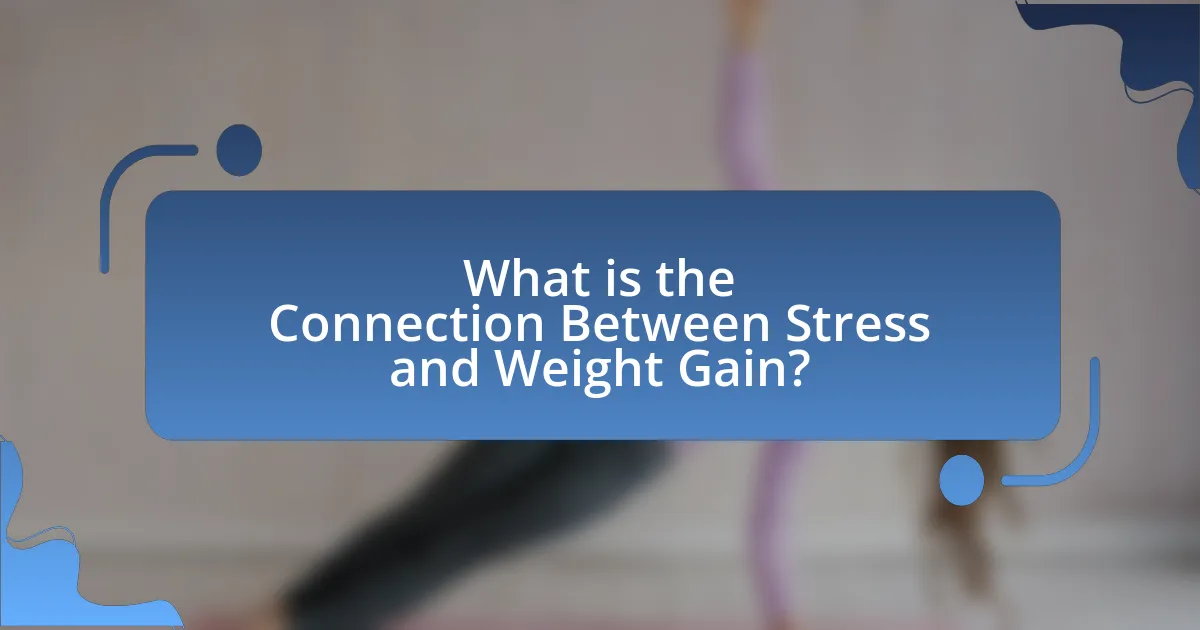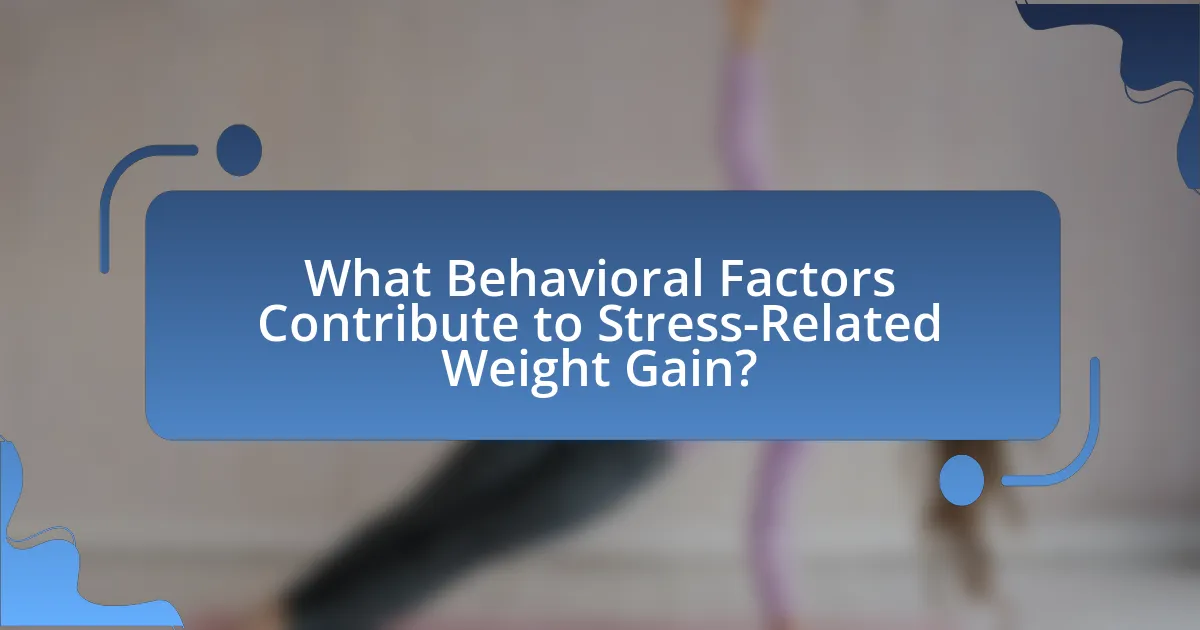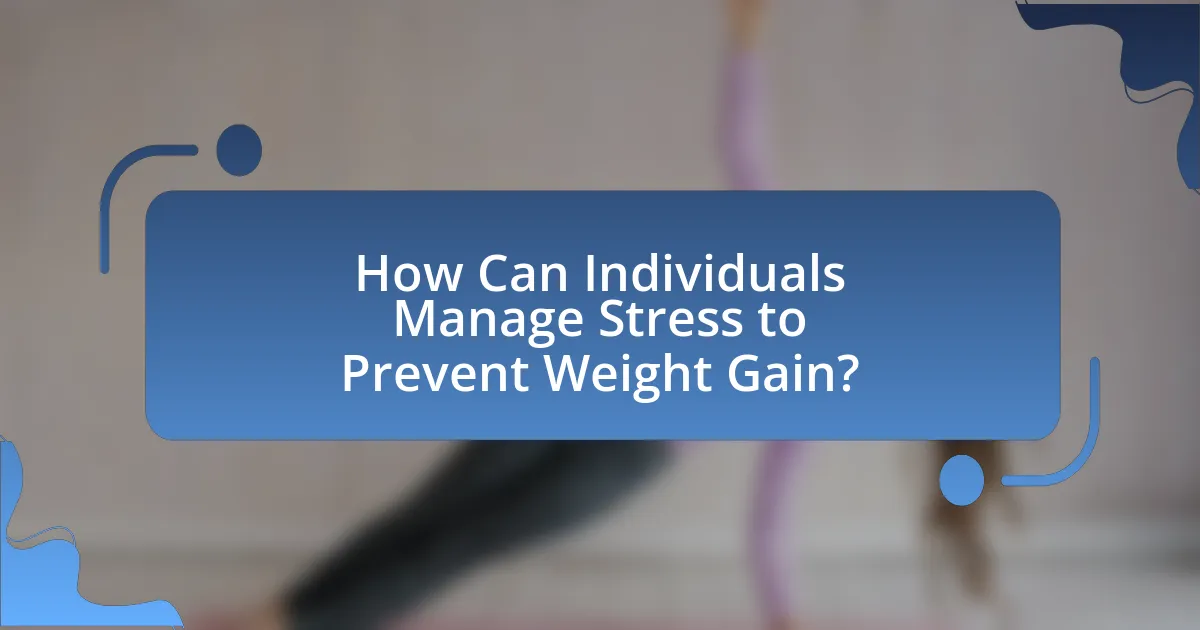The article examines the connection between stress and weight gain, emphasizing the role of cortisol, a hormone that increases appetite and cravings for high-calorie foods during stressful periods. It discusses how chronic stress leads to unhealthy eating patterns, emotional eating, and decreased physical activity, all contributing to weight gain, particularly in the abdominal area. The article also highlights the physiological mechanisms linking stress to weight gain, the health risks associated with stress-induced weight gain, and effective stress management techniques that can aid in weight control, such as mindfulness, regular exercise, and balanced dietary habits. Understanding these connections is crucial for developing targeted interventions to improve overall well-being and manage weight effectively.

What is the Connection Between Stress and Weight Gain?
Stress is directly linked to weight gain primarily through the hormone cortisol, which increases appetite and cravings for high-calorie foods. When individuals experience stress, their bodies release cortisol, leading to increased fat storage, particularly in the abdominal area. Research indicates that chronic stress can lead to overeating and unhealthy eating patterns, as individuals often turn to food for comfort. A study published in the journal “Obesity” found that higher cortisol levels are associated with greater body mass index (BMI) and waist circumference, reinforcing the connection between stress and weight gain.
How does stress influence weight gain in individuals?
Stress influences weight gain in individuals primarily through hormonal changes and behavioral responses. When a person experiences stress, the body releases cortisol, a hormone that can increase appetite and cravings for high-calorie foods. Research indicates that elevated cortisol levels are associated with increased fat accumulation, particularly in the abdominal area, which is linked to various health risks. Additionally, stress often leads to emotional eating, where individuals consume food as a coping mechanism, further contributing to weight gain. Studies have shown that individuals under chronic stress are more likely to engage in unhealthy eating patterns, leading to an increase in body weight over time.
What physiological mechanisms link stress to weight gain?
Stress triggers physiological mechanisms that promote weight gain primarily through the release of cortisol, a hormone produced by the adrenal glands. Elevated cortisol levels lead to increased appetite and cravings for high-calorie foods, particularly those rich in sugar and fat. Additionally, stress can disrupt metabolic processes, leading to fat accumulation, especially in the abdominal area. Research indicates that chronic stress can also alter insulin sensitivity, further contributing to weight gain by promoting fat storage. These mechanisms collectively illustrate how stress can significantly influence body weight through hormonal and metabolic changes.
How do stress hormones affect appetite and metabolism?
Stress hormones, particularly cortisol, significantly influence appetite and metabolism by increasing cravings for high-calorie foods and altering energy expenditure. Elevated cortisol levels, often resulting from chronic stress, stimulate appetite through mechanisms that enhance the desire for sugary and fatty foods, leading to increased caloric intake. Additionally, cortisol affects metabolism by promoting fat storage, particularly in the abdominal area, and reducing the body’s ability to burn fat efficiently. Research indicates that prolonged exposure to high cortisol levels can lead to metabolic syndrome, characterized by obesity, insulin resistance, and increased risk of cardiovascular diseases.
Why is understanding this connection important?
Understanding the connection between stress and weight gain is important because it reveals how psychological factors can influence physical health. Research indicates that chronic stress triggers hormonal changes, particularly an increase in cortisol, which can lead to increased appetite and cravings for high-calorie foods. A study published in the journal “Obesity” by Epel et al. (2000) found that individuals with higher stress levels were more likely to gain weight, particularly in the abdominal area, which is associated with greater health risks. Recognizing this connection allows for the development of targeted interventions that address both stress management and weight control, ultimately improving overall well-being.
What are the potential health risks associated with stress-induced weight gain?
Stress-induced weight gain can lead to several significant health risks, including obesity, cardiovascular disease, type 2 diabetes, and mental health disorders. The physiological response to stress often involves the release of cortisol, a hormone that can increase appetite and promote fat accumulation, particularly in the abdominal area. Research indicates that individuals experiencing chronic stress are more likely to engage in unhealthy eating behaviors, which can exacerbate weight gain and contribute to obesity-related health issues. For instance, a study published in the journal “Obesity” found that higher cortisol levels are associated with increased visceral fat, which is linked to a greater risk of metabolic syndrome and cardiovascular problems. Additionally, stress can negatively impact mental health, leading to anxiety and depression, which can further perpetuate unhealthy lifestyle choices and weight gain.
How can this understanding improve weight management strategies?
Understanding the connection between stress and weight gain can significantly enhance weight management strategies by enabling targeted interventions that address the psychological factors influencing eating behaviors. Research indicates that stress triggers hormonal changes, such as increased cortisol levels, which can lead to cravings for high-calorie foods and emotional eating. By incorporating stress management techniques, such as mindfulness, cognitive-behavioral therapy, and physical activity, weight management programs can reduce stress-related eating and promote healthier food choices. A study published in the journal “Obesity” found that participants who engaged in stress-reduction practices lost more weight compared to those who did not, highlighting the effectiveness of addressing stress in weight management strategies.

What Behavioral Factors Contribute to Stress-Related Weight Gain?
Behavioral factors that contribute to stress-related weight gain include emotional eating, decreased physical activity, and poor sleep patterns. Emotional eating occurs when individuals consume food in response to stress rather than hunger, leading to increased caloric intake. Research indicates that stress can trigger cravings for high-calorie, comfort foods, which further exacerbates weight gain. Decreased physical activity often accompanies stress, as individuals may feel fatigued or lack motivation to exercise, resulting in fewer calories burned. Additionally, poor sleep patterns, often a consequence of stress, can disrupt hormonal balance, increasing appetite and cravings, particularly for unhealthy foods. Studies show that chronic stress can lead to alterations in cortisol levels, which are linked to increased fat accumulation, particularly in the abdominal area.
How do eating behaviors change under stress?
Eating behaviors typically change under stress by increasing the likelihood of emotional eating and altering food choices towards high-calorie, comfort foods. Research indicates that stress activates the hypothalamic-pituitary-adrenal (HPA) axis, leading to elevated cortisol levels, which can enhance cravings for sugary and fatty foods. A study published in the journal “Appetite” by Evers et al. (2010) found that individuals under stress are more prone to consume larger quantities of unhealthy snacks compared to those in a non-stressed state. This shift in eating behavior can contribute to weight gain over time, as the preference for high-calorie foods often leads to increased caloric intake.
What role does emotional eating play in weight gain during stressful periods?
Emotional eating significantly contributes to weight gain during stressful periods by leading individuals to consume high-calorie, unhealthy foods as a coping mechanism. When faced with stress, the body releases cortisol, a hormone that increases appetite and cravings for comfort foods, often rich in sugar and fat. Research indicates that individuals experiencing high stress levels are more likely to engage in emotional eating, which can result in an increase in caloric intake and subsequent weight gain. A study published in the journal “Appetite” found that stress-induced emotional eating is associated with a higher body mass index (BMI), highlighting the direct link between stress, emotional eating, and weight gain.
How does stress affect food choices and cravings?
Stress significantly influences food choices and cravings by triggering physiological and psychological responses that lead to increased consumption of high-calorie, comfort foods. When individuals experience stress, the body releases cortisol, a hormone that can enhance appetite and cravings for sugary and fatty foods, often referred to as “stress eating.” Research indicates that 40% of individuals report eating more when stressed, with a preference for foods high in sugar and fat, which provide temporary relief and pleasure. This behavior can contribute to weight gain over time, as the consumption of these foods often exceeds caloric needs, leading to an energy surplus.
What lifestyle factors exacerbate stress and weight gain?
Sedentary behavior, poor dietary choices, and inadequate sleep are lifestyle factors that exacerbate stress and weight gain. Sedentary behavior, characterized by prolonged periods of inactivity, leads to decreased energy expenditure, contributing to weight gain and increased stress levels due to reduced physical activity’s positive effects on mood. Poor dietary choices, such as high consumption of processed foods and sugars, can trigger inflammation and hormonal imbalances, further elevating stress and promoting weight gain. Inadequate sleep disrupts hormonal regulation, particularly cortisol and insulin, which can lead to increased appetite and cravings, compounding both stress and weight gain. Research indicates that individuals with poor sleep patterns are more likely to experience weight gain and heightened stress responses, reinforcing the interconnectedness of these lifestyle factors.
How does lack of physical activity contribute to stress-related weight gain?
Lack of physical activity contributes to stress-related weight gain by reducing the body’s ability to manage stress hormones, particularly cortisol, which can lead to increased appetite and fat storage. When individuals do not engage in regular exercise, their bodies may experience elevated cortisol levels due to stress, which has been shown to promote cravings for high-calorie foods and lead to overeating. Research indicates that physical activity helps regulate cortisol levels and enhances mood, thereby mitigating the effects of stress on weight gain. For instance, a study published in the journal “Obesity” found that individuals who exercised regularly had lower cortisol levels and better weight management compared to sedentary individuals.
What impact does sleep deprivation have on stress and weight management?
Sleep deprivation significantly increases stress levels and negatively impacts weight management. Research indicates that lack of sleep elevates cortisol, a stress hormone, which can lead to increased appetite and cravings for high-calorie foods. A study published in the journal “Obesity” found that individuals who sleep less than seven hours per night are more likely to experience weight gain due to hormonal imbalances that promote hunger and fat storage. Additionally, sleep deprivation can impair metabolic function, making it harder for the body to regulate weight effectively.

How Can Individuals Manage Stress to Prevent Weight Gain?
Individuals can manage stress to prevent weight gain by implementing regular physical activity, practicing mindfulness techniques, and maintaining a balanced diet. Engaging in physical exercise, such as aerobic activities, has been shown to reduce stress hormones like cortisol, which is linked to weight gain. A study published in the Journal of Clinical Psychology found that individuals who exercised regularly reported lower stress levels and better weight management outcomes. Mindfulness practices, such as meditation and deep-breathing exercises, can also help individuals cope with stress, leading to healthier eating habits and reduced emotional eating. Furthermore, maintaining a balanced diet rich in whole foods can stabilize blood sugar levels and reduce cravings triggered by stress.
What effective stress management techniques can help control weight?
Effective stress management techniques that can help control weight include mindfulness meditation, regular physical activity, and cognitive-behavioral therapy (CBT). Mindfulness meditation reduces stress by promoting relaxation and awareness, which can decrease emotional eating. Research indicates that individuals practicing mindfulness report lower levels of stress and improved weight management outcomes. Regular physical activity not only alleviates stress but also helps regulate appetite and metabolism, contributing to weight control. A study published in the Journal of Obesity found that participants engaging in consistent exercise experienced significant reductions in stress and weight. Cognitive-behavioral therapy addresses negative thought patterns related to stress and eating behaviors, leading to healthier lifestyle choices. Evidence from the American Psychological Association supports the effectiveness of CBT in reducing stress and aiding weight loss.
How can mindfulness and meditation reduce stress-related eating?
Mindfulness and meditation can reduce stress-related eating by enhancing awareness of emotional triggers and promoting healthier coping mechanisms. These practices encourage individuals to observe their thoughts and feelings without judgment, which helps in recognizing the urge to eat in response to stress rather than hunger. Research indicates that mindfulness-based interventions can lead to significant reductions in emotional eating behaviors. For instance, a study published in the journal “Appetite” found that participants who engaged in mindfulness meditation reported lower levels of stress and reduced cravings for unhealthy foods. This evidence supports the effectiveness of mindfulness and meditation in mitigating stress-related eating.
What role does regular exercise play in managing stress and weight?
Regular exercise plays a crucial role in managing both stress and weight by promoting the release of endorphins, which are natural mood lifters, and by increasing metabolic rate. Engaging in physical activity reduces levels of the body’s stress hormones, such as cortisol, while simultaneously enhancing overall mood and well-being. Studies indicate that individuals who exercise regularly experience lower levels of anxiety and depression, which are often linked to weight gain due to stress-induced eating behaviors. For instance, a study published in the Journal of Clinical Psychology found that participants who engaged in regular aerobic exercise reported significant reductions in stress and improvements in mood, leading to healthier eating patterns and weight management.
What practical tips can individuals implement to address this issue?
Individuals can implement stress management techniques to mitigate weight gain associated with stress. Practicing mindfulness meditation has been shown to reduce stress levels and improve emotional regulation, which can help prevent stress-induced overeating. A study published in the journal “Health Psychology” found that mindfulness practices can lead to significant reductions in stress and improvements in weight management. Additionally, engaging in regular physical activity, such as aerobic exercise, can lower cortisol levels, a hormone linked to stress and weight gain. Research from the “American Journal of Preventive Medicine” indicates that consistent exercise not only reduces stress but also aids in weight control. Lastly, maintaining a balanced diet rich in whole foods can help stabilize mood and energy levels, further reducing the likelihood of stress-related weight gain.
How can meal planning and healthy eating habits mitigate stress effects?
Meal planning and healthy eating habits can mitigate stress effects by providing structure and nutritional balance, which help stabilize mood and energy levels. Structured meal planning reduces the likelihood of impulsive eating, which is often triggered by stress, while a diet rich in whole foods, such as fruits, vegetables, and lean proteins, supports brain health and emotional regulation. Research indicates that a balanced diet can lower cortisol levels, the hormone associated with stress, thereby reducing its physiological impact. For instance, a study published in the journal “Nutrients” found that individuals who adhered to a Mediterranean diet experienced lower levels of perceived stress and anxiety. This evidence supports the notion that intentional meal planning and healthy eating can serve as effective strategies for managing stress.
What strategies can help maintain a balanced lifestyle during stressful times?
To maintain a balanced lifestyle during stressful times, individuals should implement strategies such as regular physical activity, mindfulness practices, and structured routines. Regular physical activity, such as aerobic exercises, has been shown to reduce stress hormones and improve mood, which can help mitigate the effects of stress on weight gain. Mindfulness practices, including meditation and deep-breathing exercises, can enhance emotional regulation and decrease anxiety, contributing to better lifestyle choices. Additionally, establishing structured routines for meals and sleep can promote stability and reduce the likelihood of stress-induced overeating. Research indicates that these strategies can effectively counteract the behavioral patterns associated with stress and weight gain, as highlighted in studies on stress management and health outcomes.


